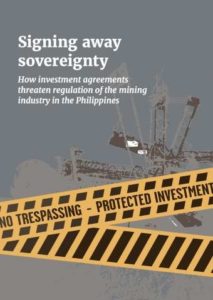
In the last decade, the resource-rich Philippines has bet heavily on the mining industry as a development strategy, an approach that has come under growing scrutiny. With 47 large-scale mines in operation and growing evidence of their social and environmental costs, all the presidential candidates in May 2016 election were forced to explain their position on, and their financial ties to, the extractive industry. Most candidates, including President-elect Rodrigo Duterte, argued for “responsible mining” and an end to “exploitative contracts”. Yet few candidates addressed whether a new government could effectively enforce new regulations on a largely foreign-controlled mining industry.
This briefing argues that the country’s ability to properly regulate or close polluting mines will be severely constrained by a network of investment treaties the Philippines has signed, which provide excessive protection for foreign investors. This legal straitjacket will become still tighter if the government goes ahead with the EU–Philippines Free Trade Agreement and the Regional Comprehensive Economic Partnership (RCEP).



![[IN PHOTOS] In Defense of Human Rights and Dignity Movement (iDEFEND) Mobilization on the fourth State of the Nation Address (SONA) of Ferdinand Marcos, Jr.](https://focusweb.org/wp-content/uploads/2025/07/1-150x150.jpg)

